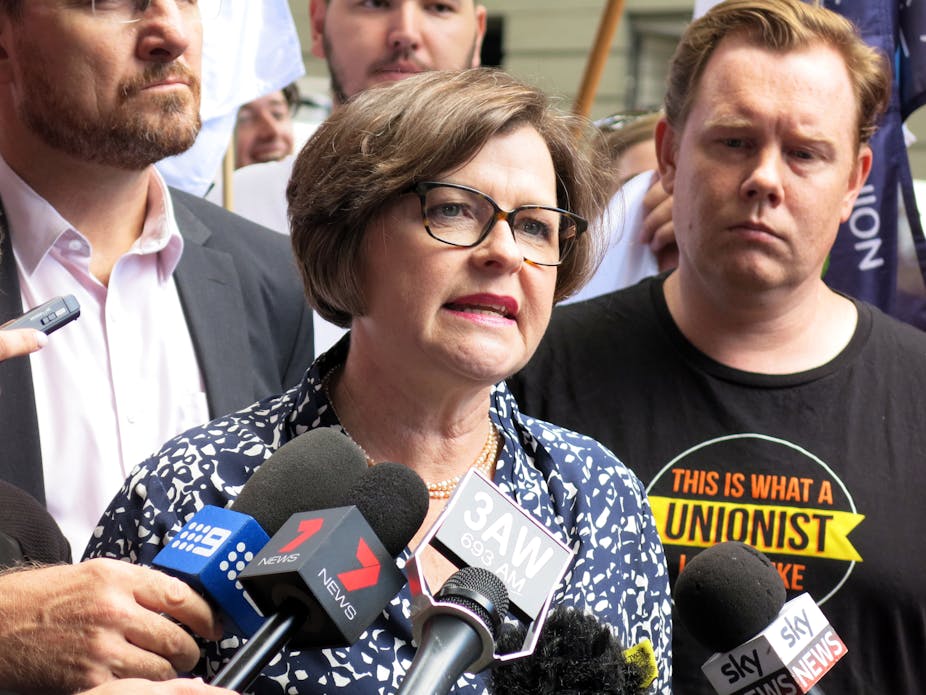Hospitality, fast-food, retail and pharmacy workers stand to lose thousands of dollars per year after the Fair Work Commission’s landmark decision to cut penalty rates on Sundays and public holidays.
The Australian Council of Trade Unions (ACTU) said the decision to reduce the rates would affect nearly 1 million workers, costing some up to A$6,000 per year. But employers welcomed the cut and said it would help create employment.
Opposition Leader Bill Shorten said Labor would fight the cuts “in parliament and in the courts”. It would use another hearing to try to stop them being implemented and if that failed a future Labor government would change the rules under which the Fair Work Commission operated.
In hospitality, the Sunday rates for full-time and part-time employees will go from 175% to 150% – but there will be no change for casual workers. Rates in the fast food award for level 1 employees will fall from 150% to 125% for full-time and part-time employees, and from 175% to 150% for casual workers.
The fall under the retail award is from 200% to 150% for full-time and part-time employees, and from 200% and 175% for casual workers.
The pharmacy award rates applying between the hours of 7AM and 9PM will go from 200% to 150% for full and part-time workers, and from 200% to 175% for casual employees.
The cuts are due to start from July with transitional arrangements about their phase in to be worked out.
The rates for public holidays have also been reduced.
The full bench of the commission agreed with the argument that there were likely to be some positive employment effects from reducing penalty rates but said they were difficult to quantify. It accepted that for many workers Sunday work had a “disutility” higher than Saturday work but said it was much less than in the past.
Except for the fast food area, the Sunday penalty rates have not been brought to the same level as Saturday penalty rates.


ACTU president Ged Kearney called on Prime Minister Malcolm Turnbull “to stand up for workers in this country, to actually change the laws to protect people’s pay”.
She said that unless Turnbull acted immediately, he would “forever be remembered as the prime minister who oversaw an attack on the wages of the lowest-paid people in our economy”.
The government did not put in a submission to the commission inquiry. Employment Minister Michaelia Cash said the decision was a direct result of a process that Shorten put in train when he was workplace minister to require the commission to review penalty rates as part of a wider review process.
“The Labor Party is desperate to shift responsibility for today’s decision, however it is a transparent effort to distract attention away from the fact that its own leader was the architect of this review,” Cash said.
She said she had spoken to many employers, especially in rural and regional Australia, “who are unable to open on a Sunday … they will now be able to be open on a Sunday. That is a good thing, in particular for those who are currently unemployed or who are underemployed.”
The decision aligned the penalty rates in the industries “more closely with Saturday penalty rates”.
Shorten said it was a “weak and unfair decision” – the thin end of the wedge. “No Australian’s penalty rates are safe under this government.” The decision was a “disaster for the economy”, which would hurt confidence.
Labor would not stand by and allow workers penalty rates to be cut, Shorten said. “We will do everything in our power, in the parliament and in the courts, to remedy this bad decision,” he said.
“There will be another set of hearings to look at how this disastrous, kick in the guts is implemented … we are going to do our best to convince the Fair Work Commission not to implement this decision,” Shorten said.
“If we are unsuccessful, we will also be changing the law in parliament to change the rules that the Fair Work Commission operate under.”
Innes Willox, the head of the Australian Industry Group, which represents the fast-food industry, said the decision would allow young people to get jobs. It was a sensible, balanced and fair decision, he said.
The Australian Chamber of Commerce and Industry said: “The changes to penalty rates awarded by the commission will give thousands of small and family-run businesses more capacity and new incentives to hire staff, give more hours to existing staff and increase services”.
But it said the benefits would have been greater if the reductions were more significant and more widely applied.

